2010年高考英语二轮复习课件模块三:unit three
文档属性
| 名称 | 2010年高考英语二轮复习课件模块三:unit three | 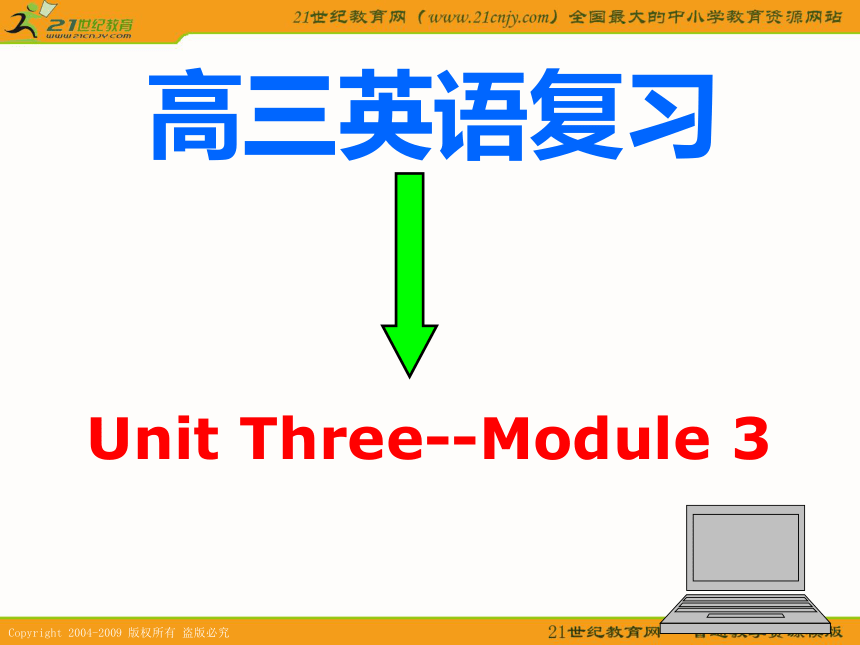 | |
| 格式 | rar | ||
| 文件大小 | 126.7KB | ||
| 资源类型 | 教案 | ||
| 版本资源 | 通用版 | ||
| 科目 | 英语 | ||
| 更新时间 | 2010-03-06 12:14:00 | ||
图片预览

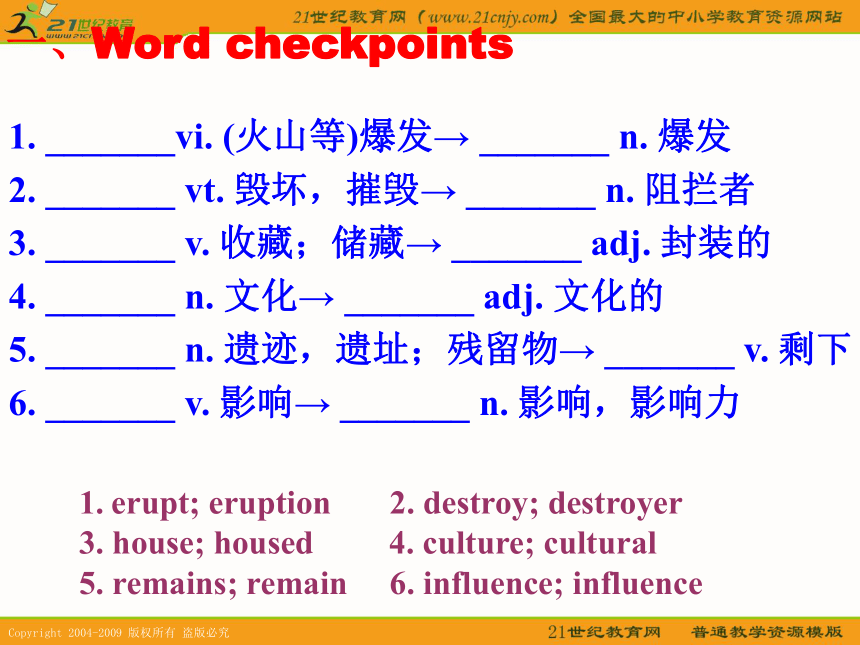
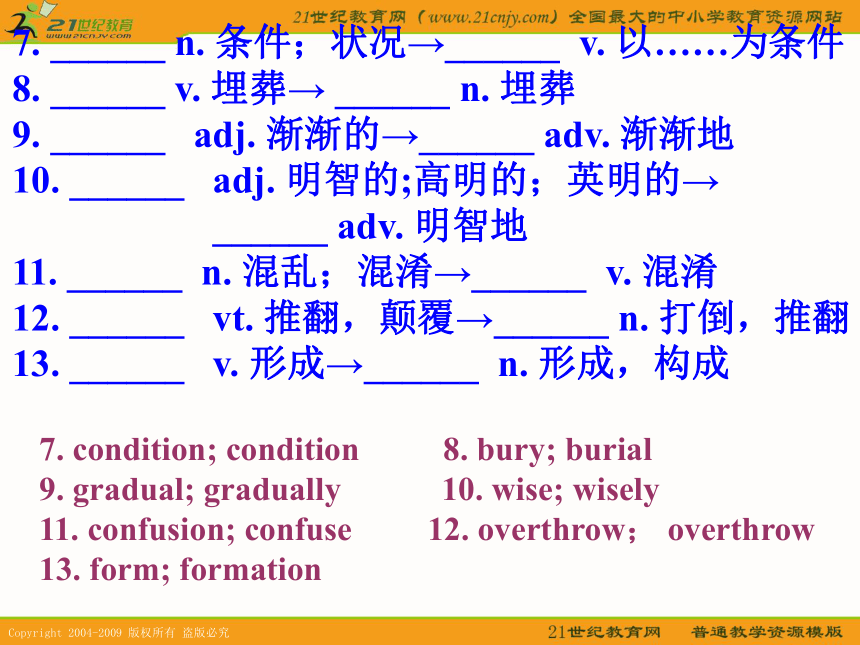
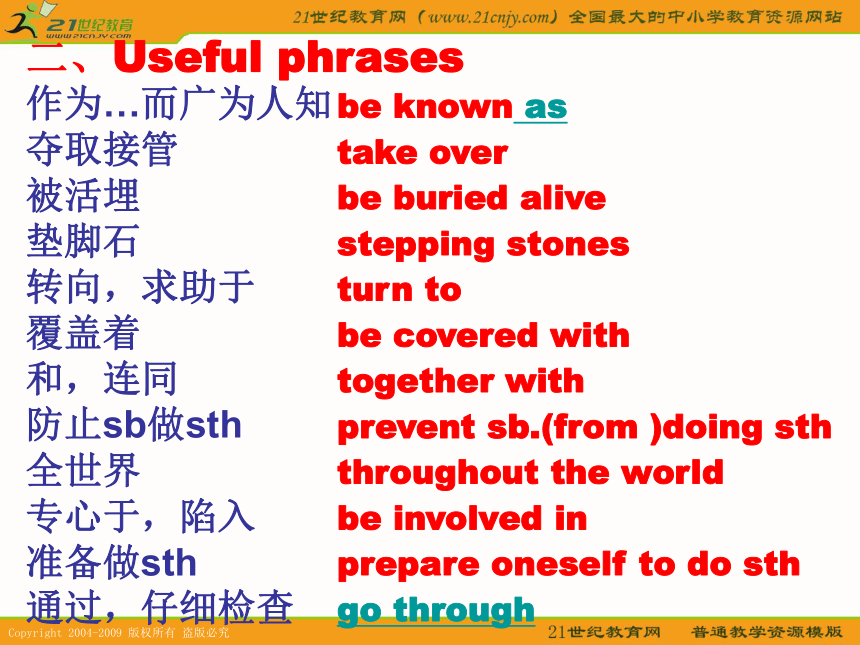
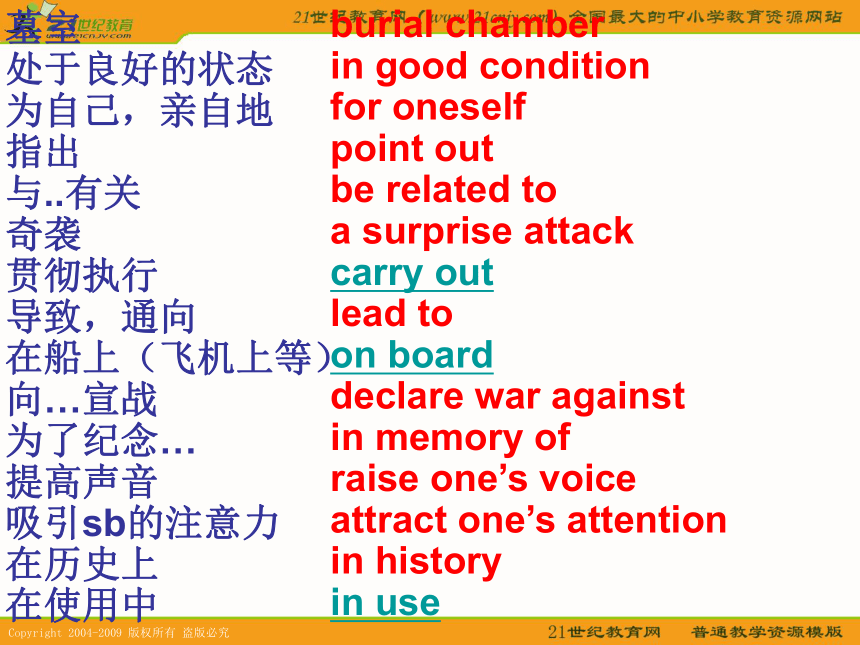
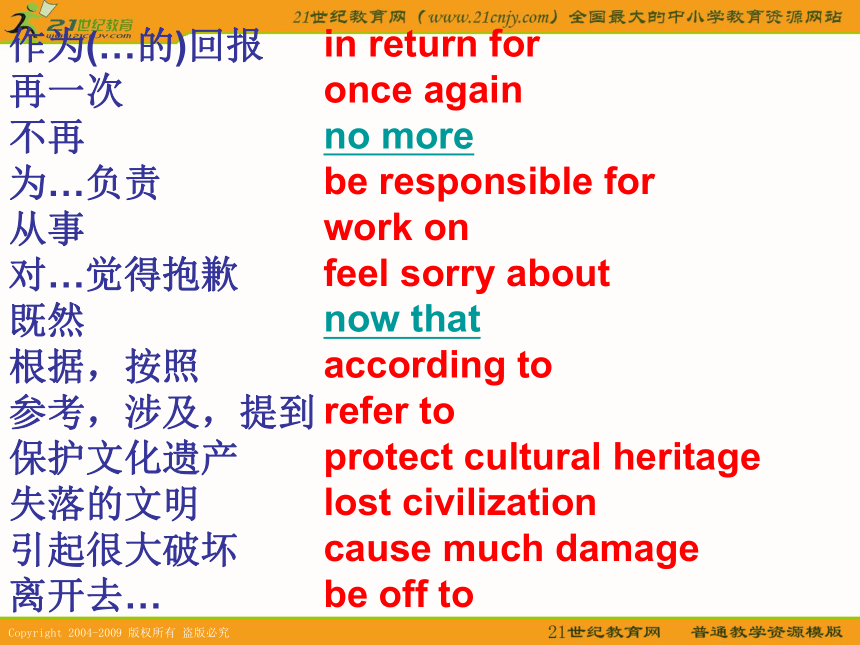
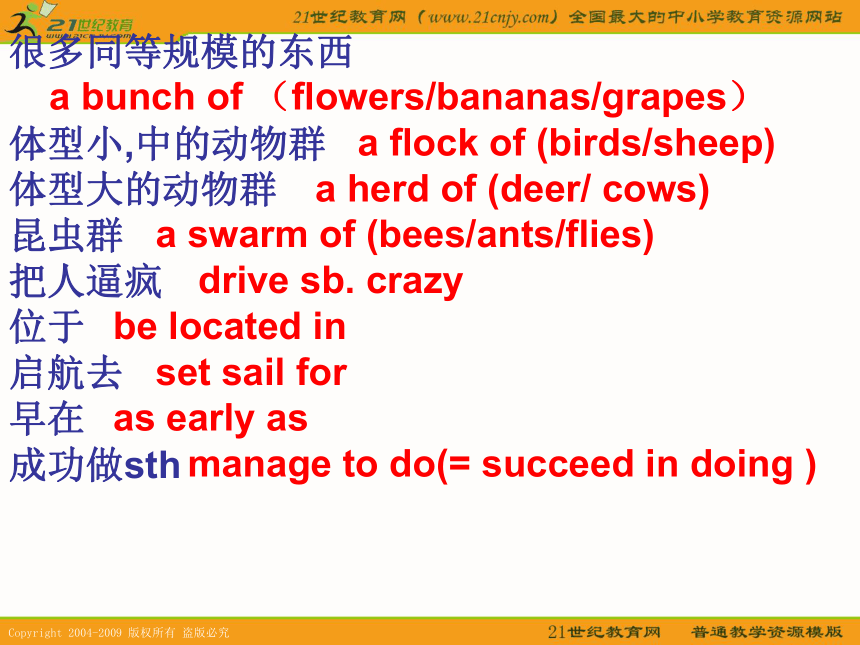
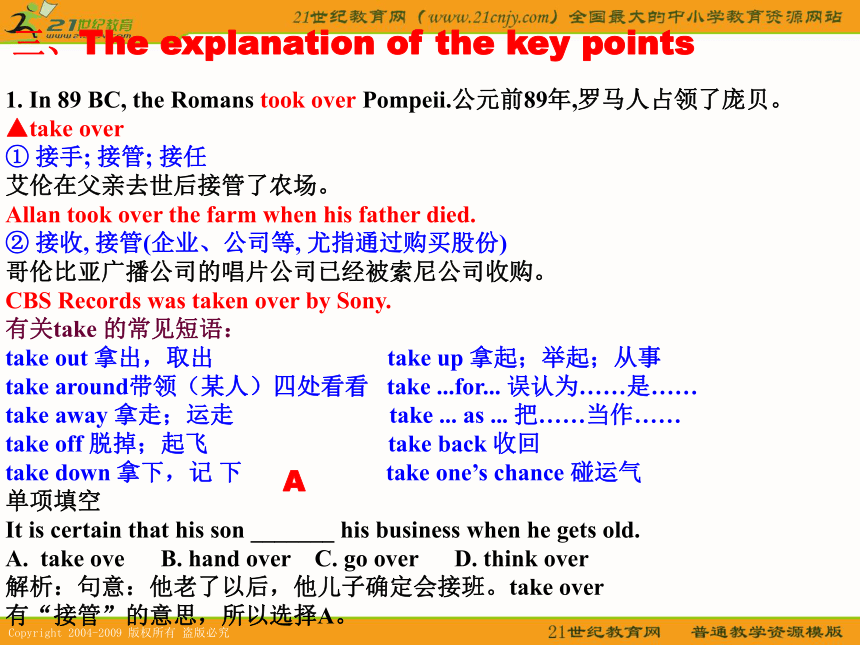
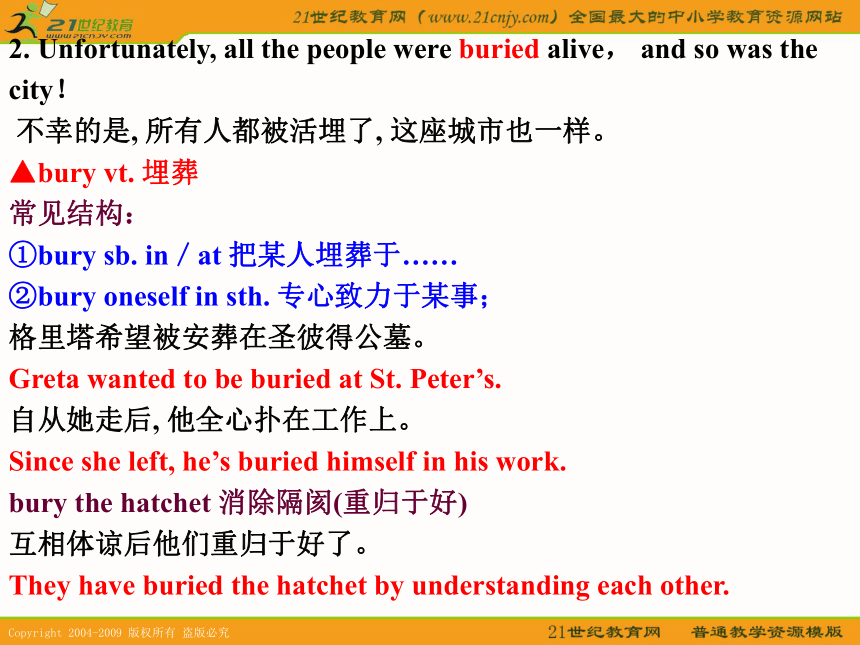
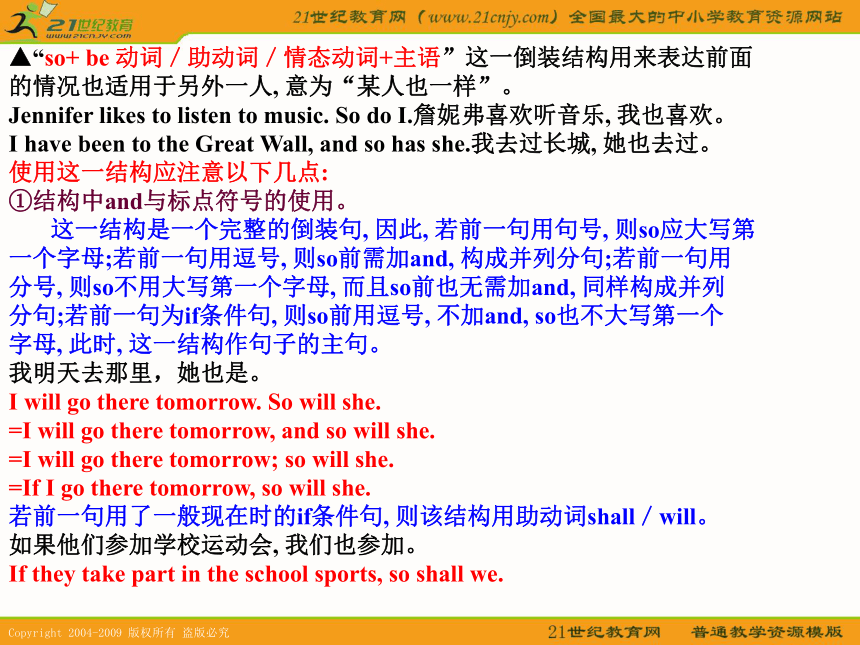
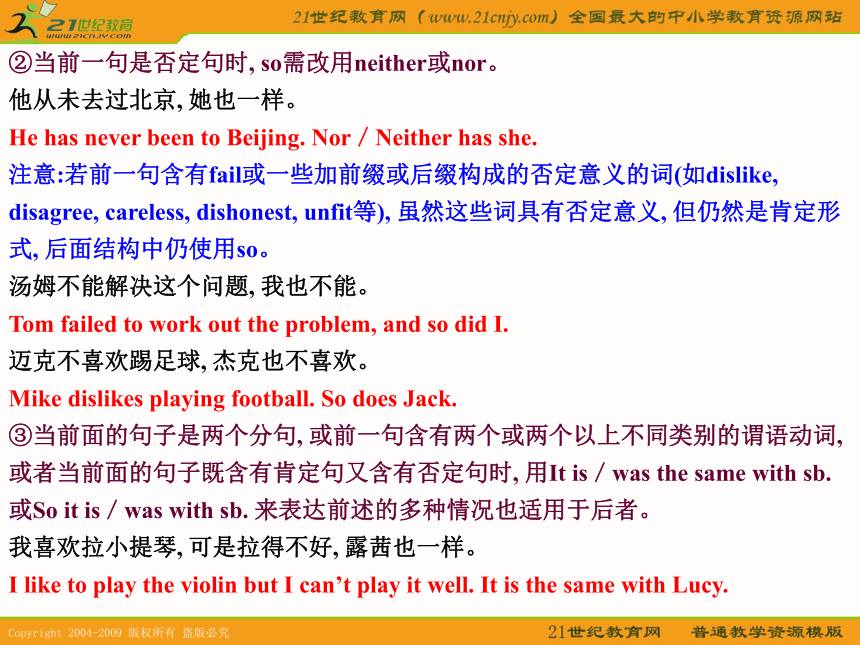
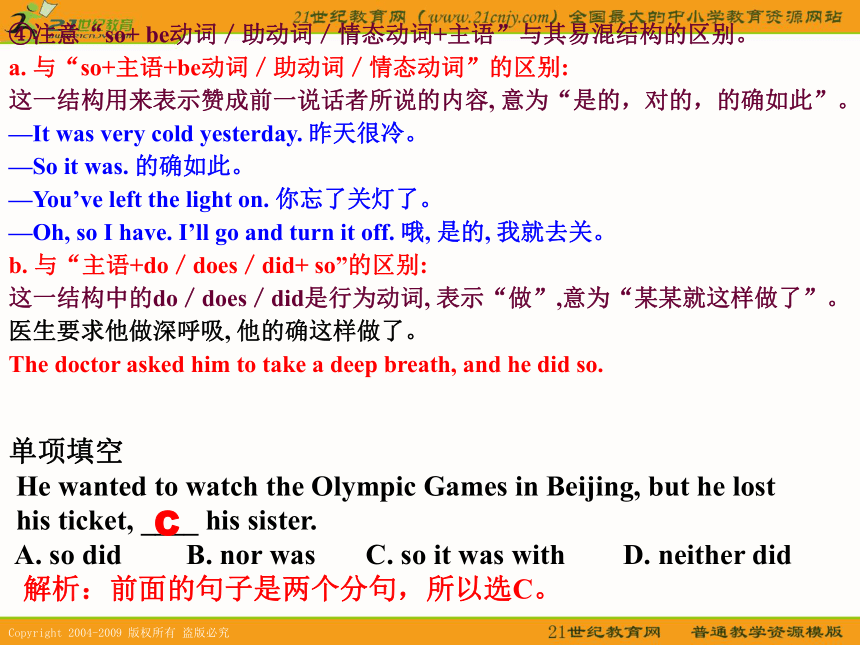
文档简介
课件40张PPT。高三英语复习Unit Three--Module 31. _______vi. (火山等)爆发→ _______ n. 爆发
2. _______ vt. 毁坏,摧毁→ _______ n. 阻拦者
3. _______ v. 收藏;储藏→ _______ adj. 封装的
4. _______ n. 文化→ _______ adj. 文化的
5. _______ n. 遗迹,遗址;残留物→ _______ v. 剩下
6. _______ v. 影响→ _______ n. 影响,影响力erupt; eruption 2. destroy; destroyer
3. house; housed 4. culture; cultural
5. remains; remain 6. influence; influence 一、Word checkpoints7. ______ n. 条件;状况→______ v. 以……为条件
8. ______ v. 埋葬→ ______ n. 埋葬
9. ______ adj. 渐渐的→______ adv. 渐渐地
10. ______ adj. 明智的;高明的;英明的→
______ adv. 明智地
11. ______ n. 混乱;混淆→______ v. 混淆
12. ______ vt. 推翻,颠覆→______ n. 打倒,推翻
13. ______ v. 形成→______ n. 形成,构成 7. condition; condition 8. bury; burial
9. gradual; gradually 10. wise; wisely
11. confusion; confuse 12. overthrow; overthrow
13. form; formation 二、Useful phrases
作为…而广为人知
夺取接管
被活埋
垫脚石
转向,求助于
覆盖着
和,连同
防止sb做sth
全世界
专心于,陷入
准备做sth
通过,仔细检查 be known as
take over
be buried alive
stepping stones
turn to
be covered with
together with
prevent sb.(from )doing sth
throughout the world
be involved in
prepare oneself to do sth
go through墓室
处于良好的状态
为自己,亲自地
指出
与..有关
奇袭
贯彻执行
导致,通向
在船上(飞机上等)
向…宣战
为了纪念…
提高声音
吸引sb的注意力
在历史上
在使用中 burial chamber
in good condition
for oneself
point out
be related to
a surprise attack
carry out
lead to
on board
declare war against
in memory of
raise one’s voice
attract one’s attention
in history
in use作为(…的)回报
再一次
不再
为…负责
从事
对…觉得抱歉
既然
根据,按照
参考,涉及,提到
保护文化遗产
失落的文明
引起很大破坏
离开去… in return for
once again
no more
be responsible for
work on
feel sorry about
now that
according to
refer to
protect cultural heritage
lost civilization
cause much damage
be off to很多同等规模的东西
体型小,中的动物群
体型大的动物群
昆虫群
把人逼疯
位于
启航去
早在
成功做sth
a bunch of (flowers/bananas/grapes)
a flock of (birds/sheep)
a herd of (deer/ cows)
a swarm of (bees/ants/flies)
drive sb. crazy
be located in
set sail for
as early as
manage to do(= succeed in doing )1. In 89 BC, the Romans took over Pompeii.公元前89年,罗马人占领了庞贝。
▲take over
① 接手; 接管; 接任
艾伦在父亲去世后接管了农场。
Allan took over the farm when his father died.
② 接收, 接管(企业、公司等, 尤指通过购买股份)
哥伦比亚广播公司的唱片公司已经被索尼公司收购。
CBS Records was taken over by Sony.
有关take 的常见短语:
take out 拿出,取出 take up 拿起;举起;从事
take around带领(某人)四处看看 take ...for... 误认为……是……
take away 拿走;运走 take ... as ... 把……当作……
take off 脱掉;起飞 take back 收回
take down 拿下,记 下 take one’s chance 碰运气
单项填空
It is certain that his son _______ his business when he gets old.
A. take ove B. hand over C. go over D. think over
解析:句意:他老了以后,他儿子确定会接班。take over
有“接管”的意思,所以选择A。A三、The explanation of the key points 2. Unfortunately, all the people were buried alive, and so was the city!
不幸的是, 所有人都被活埋了, 这座城市也一样。
▲bury vt. 埋葬
常见结构:
①bury sb. in/at 把某人埋葬于……
②bury oneself in sth. 专心致力于某事;
格里塔希望被安葬在圣彼得公墓。
Greta wanted to be buried at St. Peter’s.
自从她走后, 他全心扑在工作上。
Since she left, he’s buried himself in his work.
bury the hatchet 消除隔阂(重归于好)
互相体谅后他们重归于好了。
They have buried the hatchet by understanding each other. ▲“so+ be 动词/助动词/情态动词+主语”这一倒装结构用来表达前面
的情况也适用于另外一人, 意为“某人也一样”。
Jennifer likes to listen to music. So do I.詹妮弗喜欢听音乐, 我也喜欢。
I have been to the Great Wall, and so has she.我去过长城, 她也去过。
使用这一结构应注意以下几点:
①结构中and与标点符号的使用。
这一结构是一个完整的倒装句, 因此, 若前一句用句号, 则so应大写第
一个字母;若前一句用逗号, 则so前需加and, 构成并列分句;若前一句用
分号, 则so不用大写第一个字母, 而且so前也无需加and, 同样构成并列
分句;若前一句为if条件句, 则so前用逗号, 不加and, so也不大写第一个
字母, 此时, 这一结构作句子的主句。
我明天去那里,她也是。
I will go there tomorrow. So will she.
=I will go there tomorrow, and so will she.
=I will go there tomorrow; so will she.
=If I go there tomorrow, so will she.
若前一句用了一般现在时的if条件句, 则该结构用助动词shall/will。
如果他们参加学校运动会, 我们也参加。
If they take part in the school sports, so shall we.②当前一句是否定句时, so需改用neither或nor。
他从未去过北京, 她也一样。
He has never been to Beijing. Nor/Neither has she.
注意:若前一句含有fail或一些加前缀或后缀构成的否定意义的词(如dislike,
disagree, careless, dishonest, unfit等), 虽然这些词具有否定意义, 但仍然是肯定形式, 后面结构中仍使用so。
汤姆不能解决这个问题, 我也不能。
Tom failed to work out the problem, and so did I.
迈克不喜欢踢足球, 杰克也不喜欢。
Mike dislikes playing football. So does Jack.
③当前面的句子是两个分句, 或前一句含有两个或两个以上不同类别的谓语动词, 或者当前面的句子既含有肯定句又含有否定句时, 用It is/was the same with sb. 或So it is/was with sb. 来表达前述的多种情况也适用于后者。
我喜欢拉小提琴, 可是拉得不好, 露茜也一样。
I like to play the violin but I can’t play it well. It is the same with Lucy. ④注意“so+ be动词/助动词/情态动词+主语”与其易混结构的区别。
a. 与“so+主语+be动词/助动词/情态动词”的区别:
这一结构用来表示赞成前一说话者所说的内容, 意为“是的,对的,的确如此”。
—It was very cold yesterday. 昨天很冷。
—So it was. 的确如此。
—You’ve left the light on. 你忘了关灯了。
—Oh, so I have. I’ll go and turn it off. 哦, 是的, 我就去关。
b. 与“主语+do/does/did+ so”的区别:
这一结构中的do/does/did是行为动词, 表示“做”,意为“某某就这样做了”。
医生要求他做深呼吸, 他的确这样做了。
The doctor asked him to take a deep breath, and he did so.单项填空
He wanted to watch the Olympic Games in Beijing, but he lost
his ticket, ____ his sister.
A. so did B. nor was C. so it was with D. neither did
解析:前面的句子是两个分句,所以选C。C4. I also saw the bodies of people that had been turned to stone when they had been
covered with ash—they are kept exactly as they were 2,000 years ago.
我也看到了一些人的尸体, 当他们被火山灰覆盖时已经变成了石块——他们保持得
跟两千年前一模一样。
▲turn to(into) sth. 变成
几周之后, 毛毛虫就会变成蝴蝶了。
In a few weeks, the caterpillar will turn to(into) a butterfly.
turn sth. into sth. 把……变成……
The fairy turned the pumpkin into a coach.仙女把那只南瓜变成了马车。
有关turn的常见短语:
turn to sb. for help 向某人求助 turn down 调低;拒绝
turn on/off 打开/关上 turn up露面;出现
turn out 结果是 turn sth. upside down 翻了个底朝天
turn back 折回;掉转头 turn one’s back on 对……置之不理
单项填空
—Why does she always ask you for help?
—There’s no one else______ , is there?
A. who to turn to B. whom she can turn to C. for whom to turn D. for her to turn
解析:考查定语从句。turn to sb.向某人……求助。B5. In 1980, I was involved in... 1980年, 我忙于……
▲involve vt.
①包含;需要(后跟名词或动名词形式)
考试将包括回答一些关于照片的问题。
The test will involve answering questions about a photo.
②牵涉;牵连;影响
有一起严重的事件涉及一群年轻人。
There was a serious incident involving a group of youths.
③使参加, 加入
父母应当参与孩子们的教育。
Parents should involve themselves in children’s education.
④be involved in陷入;专注
吉尔不想来, 因为她的缝纫活太忙了。
Jill does not want to come because she’s too involved in her sewing.
他债台高筑。
He is deeply involved in debts. 6. We went through a 10-meter-long passage and we found ourselves in a large burial chamber.
我们穿过一个十米长的通道来到了一个大的墓室。
▲find +名词/代词 + 介词短语 (作宾语补足语)
She found everything in good order.她发现一切都井然有序。
常见的宾语补足语有以下形式:
①名词作宾补。
She found him a very clever boy.她发现他是个很聪明的男孩。
②形容词作宾补。
他有种奇特的方式使他的课堂生动而有趣。
He had a strange way of making his class lively and interesting.
③副词作宾补。
上周日我看见你和你姐姐一起出去了。
Last Sunday I saw you out with your sister.
④介词短语作宾补。
让她吃惊的是,她发现自己身处一个陌生的世界。
To her surprise, she found herself in a different world.
⑤现在分词作宾补。
当我经过他窗前时看见他正在做作业。
I saw him doing his homework when I passed his window. ⑥过去分词作宾补。当过去分词充当宾补时, 它与宾语之间有着动宾关系, 即:宾语是过去分词所表示的动作的承受者。
当我听到有人叫我名字时,我正在走神。
I was absent-minded when I heard my name called.
⑦动词不定式作宾补。
村民们不允许他们在那儿建工厂。
The villagers did not allow them to build a factory there.
我们看见那辆汽车停下了。
We saw the car stop.
注意:①动词ask, tell, beg, force, wish, want, expect, advise, permit,
order, persuade等后面常跟不定式作宾补。
②省略to的不定式当句子变为被动语态时需加上to。
③常接省略to的不定式作宾补的动词包括感官动词和使役动词,可记住这样
一句口诀“一感二听三让四观看”(一感:feel;二听:hear, listen to;三让:let,
have, make;四观看:observe, see, watch, look at)。
单项填空
Who will you have ______ the job?
A. to take charge of B. take charge of
C. taken charge of D. be taken charge of
解析:考查have sb. do 的结构, who 作have 的宾语。take charge of the job为不带to的不定式,作宾补。B7. Most of them were in good condition.它们大部分都完好无损。
▲in good condition 状况良好, 完好无损
我的车虽然旧,但车况很好。
My car is old but in good condition.
有关condition的常见短语:
the present conditions 现状
on condition that 在……的条件下;假如……
on no condition在任何情况下都不
be out of condition 健康状况不佳
make a condition讲条件
the condition of one’s health某人的健康状况
单项填空
_________ should you visit the places.
A. In good condition B. On no condition
C. On condition that D. On no case
句意为:你决不能去那些地方。句子为倒装结构,所以选B。B8. The conversation takes place in a classroom.
对话是在一个教室里进行的。
▲take place 发生;举行
十月革命是1917年发生的。
The October Revolution took place in 1917.
篮球比赛什么时候行?
When will the basketball match take place?
【易混辨析】 take place, happen, break out与occur
①take place 往往指按意图或计划进行的,侧重必然发生,宜用于
war, revolution等事件的发生。不用于被动语态。
②happen 指具体客观事物的发生,往往带有偶然的意味。
③break out 指“火灾,疾病,战争”等的突然发生。
The Second World War broke out in September,1939.
④occur 作“发生” 讲时, 相当于happen/ take place, 另外还有“想起”的意思。
On May 12th .2008, an earthquake occurred in Wenchuan at 2:30 .
我想到了一个好主意。
A good idea occurred to me. 9. A surprise attack was carried out there by the Japanese in 1941.
1941年日本对那里发动了突然袭击。
▲carry out 实施;执行;进行
一旦做出承诺,你就必须付诸实施。
Once you make a promise, you must carry it out.
看到我们的计划成功实施我很高兴。
I’m glad to see our plan carried out successfully.
有关carry的常见短语:
carry away 带走 carry off 夺走
carry on 进行 carry through 帮……渡过难关,坚持到底
单项填空
The government will ____ a new policy to promote the sales of the house.
A. carry on B. carry out C. carry away D. carry off
句意:政府将实施一项新政策来促进房屋的销售。carry out
实施,实行;carry on 进行;carry away 带走;carry off 夺走。B▲on board 在船上(飞机或火车上); 上船(飞机或火车)
我一上船就头晕。
As soon as I am on board, I feel sick.
飞机上有400名乘客。
There are 400 passengers on board the plane.
我们刚上火车,车就开了。
The moment we went on board the train, it started.
【联想拓展】
get/come/go on board 上船/飞机/火车
go by board (计划、安排等)失败,落空
单项填空
As soon as we_______ , our ship left port.
A. are on board B. got on board
C. got by board D. were in board
解析:get on board 上船。其他选项都与句意不符。B 【易混辨析】 declare与announce
①declare意为“宣布,宣称”。表示有信心地、正式地公开讲明某事;是正式用语,也用于国家宣告重大事宜。
他断言那是真实的。
He declared that it was true.
中美双方宣布了双边外交关系正常化。
The United States and China declared their normalization of diplomatic relations.
②announce意为“公布”,不如declare正式,尤其指将有益之事公布于众,如消息或新闻等。
他们在报纸上公布了他们的结婚日期。
They announced the date of their wedding in the newspaper.四、Important sentences
1、 _____________ (不幸地) ,all the people were buried alive, and so was the city!
2、 In 89BC, the Rome ________ _______ (占领) Pompeii.
3、 城市附近有一座火山。(倒装)____________________________________Unfortunately took over Near the city was a volcano. 4、 People started to dig in the area for the treasure, _____________________________ (造成很大破坏)。(非限制定语从句)
5、 All of them wanted to be the first________ (get) a close look at Mount Vesuvius. (page 46)
6、 The attack led to the US _______________ (come into) the World War II.
7、 有趣的是,当时另外一座最大的城市就是罗马。(主语从句)
_____________________________________________________________________________
8、 _____________(用…交换) silk, China received wine, spices, wool and others goods.which caused much damage to get coming into what is interesting is that the other largest city was Rome. In return for 9、 There is another __________( 相似处) between China and Rome.
10、 In the ___________(接下来)hundred years both Rome and China _________________ (经历一番磨难)。similarity following had a difficult time 五、Multiple choices
1、 It is neither you nor I who ______ likely to take charge of the project, though I don’t know at all.
A. was B. were C. am D. are
2、 Much to their surprise, between the two rows of trees ________ and old temple.
A. stand B. stands
C. standing D. are standing
3、 In 1865, Lincoln was made ______ of the USA for the second time.
A. President B. a President
C. the President D. PresidentsCBA4、 The director rather than the workers_______ responsible for the protection of the ruins.
A. were B. are C. is D. are to be
5、 I ‘ve been told that in English study______ idioms is of great importance.
A. grammar as well as
B. not grammar but
C. not only grammar but also
D. both grammar and
6、 --- You’re always welcome at our house.
--- _________.
A. Me too B. So do I
C. likewise D. The sameCAC7、 Children can grow healthily ____ good _____.
A. under; condition B. in; condition
C. on; condition D. at; condition
8、 ______ better wages and working conditions.
A. What interest the workers most are B. What interests the workers most are
C. What’s interesting the workers most is
D. What interests the workers most is BD9、 In 1938, Hitler ______ war against Poland, which started the WWII.
A. declared B. announced
C. broadcasted D. advertised
10、 _______, he is healthy, however.
A. Though older as he
B. Though he is as old
C. Old as he is
D. Old ad he will beACbe known as 意为“作为……而著名”,其后的名词表示一个人的身份、职业等。 be known for 意为“因……而著名”,其后所接内容表示某人或物的特点、特长等。be known to “为……所了解/知道”,其后接表示人的词语。“(人们都)知道”,其后接动词原形。be known in 意为“在某地很著名”。如: He is well-known in the town where he was born. 他在自己出生的那个镇子上很出名。芝加哥被称为“风城”。
Chicago is known as “the windy city”.
这个演员更是以作家的身份而出名。
The actor is more known as a writer.
众所周知, 理论来源于实践。
It is known to all that theory comes from practice.
众所周知, 地球围绕太阳转。
As is known to all, the earth goes around the sun.go after 追逐,追求;设法得到
go ahead 开始,进行;前进,领先
go along with 赞同,附合,支持
go around (消息)流传;足够分配
go down 下去;(船等)下沉;下降
go for 去请,去取;赞成
go in for 从事于;酷爱;追求
go into 进入;调查;从事
go into action 开始行动
go into effect 实施,生效
go on 继续下去,进行
go out 熄灭,停止运转;过时
go over 检查;复习
go through 遭受,经历;检查,审查
go up 上升,(物价等)上涨;被炸毁,被烧毁
go wrong 出错;发生故障,出毛病carry forward 发扬;进行
carry off 拿走,夺去…的生命
carry on 继续
carry out ,执行,贯彻;进行(到底)on a small/large scale 小(大)规模地
on account of 由于,因为
on average 平均;通常;普通
on board 在船(或车、飞机等)上
on business 因公出差 on duty 值班,当班
on earth 究竟,到底 on foot 步行
on guard 站岗,警戒
on occasion (s) 有时,间或
on one‘s own 独立地,靠自己地
on purpose 故意,有目的地
on sale 出售;廉价出售 on the contrary 正相反
on the one hand 一方面
on the other hand 另一方面
on the spot 在现场,当场
on the whole 总的来说,大体上
on time — 准时in a hurry 急于,忙于 ’
in a sense 从某种意义上
in a way 在某种程度上,从某一点上看
in a word 简而言之,一句话
in addition to 除…之外(还)
in advance 预先,事先
in any case 无论如何,不管怎样
in brief 简单地说
in case of 假如,如果发生;防备
in charge of 负责,主管
in common 共有的,共用的
in debt 欠债
in detail 详细的
in effect 实际上,事实上
in fact 事实上,其实
in favour of 支持,赞成
in front of 在…前面 in general 一般说来,大体上
in half 成两半
in honour of 为向…表示敬意;为纪念,为庆祝
in no case 无论如何不,决不
in no time 立即,马上
in no way 决不
in one's mind eye 在…看来
in order 按顺序;整齐
in order to 为了(做某事)
in other words 换句话说,也就是说
in part 部分地
in particular 特别,尤其
in person 亲自
in proportion to 与…成比例
in public 公开地,当众
in question 正在谈论的
in relation to 有关,涉及
in return (for) 作为(对…的)回报、交换in short 简言之,总之
in sight 看得见,在视线之内;在望
in spite of 不管,不顾
in store 储藏着;准备着;必将发生、就要到来
in that 因为
in the course of 在…期间,在…过程中
in the end 最后,终于
in the face of 在…前面;不管,即使
in the future 在将来
in the way 挡道,“妨碍某人
in time 及时;最后,终于
in touch 联系,接触
in turn 依次地,轮流地;转而,反过来
in vain 徒劳,白费力
in stead of 替代,而不是no more 和no longer的区别 1. no longer中的longer是副词long的比较级,long有after a certain point of time(在某一时刻以后)之意,着重表示时间的不再延续,意为"如今不再"。no longer等于not... any longer。 2. no more中的more是many / much的比较级,more有again之意,着重表示数量或程度的减少,意为"再也没有更多(大)的数量(程度)"。no more等于not... any more。 no longer修饰延续性动词,如teach, live, work等,表示动作不再延续;no more修饰非延续性动词,如come, go , make (the same mistake)等,表示动作不再次发生。
No longer意思是“不再”,其确切含意为某状态在某个时刻之后不再继续下去了。所以,当你从学校毕业了,就可以说:I'm no longer a student.我不再是个学生了。 有两个短语和no longer同义,即not…any longer和not…any more,但他们侧重的方面不同。前者侧重时间,比如: He no longer lives here. = He doesn't live here any longer. 他不在这儿居住了。(一个时间以前他住在这儿,过了这个时间,他就离开了。) 后者侧重程度和数量,比如: You can drink no more. = You can't drink any more. 你不能再喝了。(喝酒的量到了一定程度,不能再继续下去了。) 要注意的是:由于no longer本身就带有否定的含义,即表示“再也不”,所以不能在同一个句子中加入否定词,比如: I'll come here no longer.我再也不来了。 now that = since 既然 既然已完成了工作,你就应该好好休息一下。You ought to have a good rest now that you've finished the work.Now?that?you?are?here,?you’d?better?stay.? 你既然来了,最好还是留下吧。 Now?that?you’re?well?again.?you?can?travel.?既然你身体好了,你现在可以旅行了。 Now?that?you?mention?it,?I?do?remember?the?incident.? 经你一提,我想起那事了。 注:其中的?that?通常可以省略。
2. _______ vt. 毁坏,摧毁→ _______ n. 阻拦者
3. _______ v. 收藏;储藏→ _______ adj. 封装的
4. _______ n. 文化→ _______ adj. 文化的
5. _______ n. 遗迹,遗址;残留物→ _______ v. 剩下
6. _______ v. 影响→ _______ n. 影响,影响力erupt; eruption 2. destroy; destroyer
3. house; housed 4. culture; cultural
5. remains; remain 6. influence; influence 一、Word checkpoints7. ______ n. 条件;状况→______ v. 以……为条件
8. ______ v. 埋葬→ ______ n. 埋葬
9. ______ adj. 渐渐的→______ adv. 渐渐地
10. ______ adj. 明智的;高明的;英明的→
______ adv. 明智地
11. ______ n. 混乱;混淆→______ v. 混淆
12. ______ vt. 推翻,颠覆→______ n. 打倒,推翻
13. ______ v. 形成→______ n. 形成,构成 7. condition; condition 8. bury; burial
9. gradual; gradually 10. wise; wisely
11. confusion; confuse 12. overthrow; overthrow
13. form; formation 二、Useful phrases
作为…而广为人知
夺取接管
被活埋
垫脚石
转向,求助于
覆盖着
和,连同
防止sb做sth
全世界
专心于,陷入
准备做sth
通过,仔细检查 be known as
take over
be buried alive
stepping stones
turn to
be covered with
together with
prevent sb.(from )doing sth
throughout the world
be involved in
prepare oneself to do sth
go through墓室
处于良好的状态
为自己,亲自地
指出
与..有关
奇袭
贯彻执行
导致,通向
在船上(飞机上等)
向…宣战
为了纪念…
提高声音
吸引sb的注意力
在历史上
在使用中 burial chamber
in good condition
for oneself
point out
be related to
a surprise attack
carry out
lead to
on board
declare war against
in memory of
raise one’s voice
attract one’s attention
in history
in use作为(…的)回报
再一次
不再
为…负责
从事
对…觉得抱歉
既然
根据,按照
参考,涉及,提到
保护文化遗产
失落的文明
引起很大破坏
离开去… in return for
once again
no more
be responsible for
work on
feel sorry about
now that
according to
refer to
protect cultural heritage
lost civilization
cause much damage
be off to很多同等规模的东西
体型小,中的动物群
体型大的动物群
昆虫群
把人逼疯
位于
启航去
早在
成功做sth
a bunch of (flowers/bananas/grapes)
a flock of (birds/sheep)
a herd of (deer/ cows)
a swarm of (bees/ants/flies)
drive sb. crazy
be located in
set sail for
as early as
manage to do(= succeed in doing )1. In 89 BC, the Romans took over Pompeii.公元前89年,罗马人占领了庞贝。
▲take over
① 接手; 接管; 接任
艾伦在父亲去世后接管了农场。
Allan took over the farm when his father died.
② 接收, 接管(企业、公司等, 尤指通过购买股份)
哥伦比亚广播公司的唱片公司已经被索尼公司收购。
CBS Records was taken over by Sony.
有关take 的常见短语:
take out 拿出,取出 take up 拿起;举起;从事
take around带领(某人)四处看看 take ...for... 误认为……是……
take away 拿走;运走 take ... as ... 把……当作……
take off 脱掉;起飞 take back 收回
take down 拿下,记 下 take one’s chance 碰运气
单项填空
It is certain that his son _______ his business when he gets old.
A. take ove B. hand over C. go over D. think over
解析:句意:他老了以后,他儿子确定会接班。take over
有“接管”的意思,所以选择A。A三、The explanation of the key points 2. Unfortunately, all the people were buried alive, and so was the city!
不幸的是, 所有人都被活埋了, 这座城市也一样。
▲bury vt. 埋葬
常见结构:
①bury sb. in/at 把某人埋葬于……
②bury oneself in sth. 专心致力于某事;
格里塔希望被安葬在圣彼得公墓。
Greta wanted to be buried at St. Peter’s.
自从她走后, 他全心扑在工作上。
Since she left, he’s buried himself in his work.
bury the hatchet 消除隔阂(重归于好)
互相体谅后他们重归于好了。
They have buried the hatchet by understanding each other. ▲“so+ be 动词/助动词/情态动词+主语”这一倒装结构用来表达前面
的情况也适用于另外一人, 意为“某人也一样”。
Jennifer likes to listen to music. So do I.詹妮弗喜欢听音乐, 我也喜欢。
I have been to the Great Wall, and so has she.我去过长城, 她也去过。
使用这一结构应注意以下几点:
①结构中and与标点符号的使用。
这一结构是一个完整的倒装句, 因此, 若前一句用句号, 则so应大写第
一个字母;若前一句用逗号, 则so前需加and, 构成并列分句;若前一句用
分号, 则so不用大写第一个字母, 而且so前也无需加and, 同样构成并列
分句;若前一句为if条件句, 则so前用逗号, 不加and, so也不大写第一个
字母, 此时, 这一结构作句子的主句。
我明天去那里,她也是。
I will go there tomorrow. So will she.
=I will go there tomorrow, and so will she.
=I will go there tomorrow; so will she.
=If I go there tomorrow, so will she.
若前一句用了一般现在时的if条件句, 则该结构用助动词shall/will。
如果他们参加学校运动会, 我们也参加。
If they take part in the school sports, so shall we.②当前一句是否定句时, so需改用neither或nor。
他从未去过北京, 她也一样。
He has never been to Beijing. Nor/Neither has she.
注意:若前一句含有fail或一些加前缀或后缀构成的否定意义的词(如dislike,
disagree, careless, dishonest, unfit等), 虽然这些词具有否定意义, 但仍然是肯定形式, 后面结构中仍使用so。
汤姆不能解决这个问题, 我也不能。
Tom failed to work out the problem, and so did I.
迈克不喜欢踢足球, 杰克也不喜欢。
Mike dislikes playing football. So does Jack.
③当前面的句子是两个分句, 或前一句含有两个或两个以上不同类别的谓语动词, 或者当前面的句子既含有肯定句又含有否定句时, 用It is/was the same with sb. 或So it is/was with sb. 来表达前述的多种情况也适用于后者。
我喜欢拉小提琴, 可是拉得不好, 露茜也一样。
I like to play the violin but I can’t play it well. It is the same with Lucy. ④注意“so+ be动词/助动词/情态动词+主语”与其易混结构的区别。
a. 与“so+主语+be动词/助动词/情态动词”的区别:
这一结构用来表示赞成前一说话者所说的内容, 意为“是的,对的,的确如此”。
—It was very cold yesterday. 昨天很冷。
—So it was. 的确如此。
—You’ve left the light on. 你忘了关灯了。
—Oh, so I have. I’ll go and turn it off. 哦, 是的, 我就去关。
b. 与“主语+do/does/did+ so”的区别:
这一结构中的do/does/did是行为动词, 表示“做”,意为“某某就这样做了”。
医生要求他做深呼吸, 他的确这样做了。
The doctor asked him to take a deep breath, and he did so.单项填空
He wanted to watch the Olympic Games in Beijing, but he lost
his ticket, ____ his sister.
A. so did B. nor was C. so it was with D. neither did
解析:前面的句子是两个分句,所以选C。C4. I also saw the bodies of people that had been turned to stone when they had been
covered with ash—they are kept exactly as they were 2,000 years ago.
我也看到了一些人的尸体, 当他们被火山灰覆盖时已经变成了石块——他们保持得
跟两千年前一模一样。
▲turn to(into) sth. 变成
几周之后, 毛毛虫就会变成蝴蝶了。
In a few weeks, the caterpillar will turn to(into) a butterfly.
turn sth. into sth. 把……变成……
The fairy turned the pumpkin into a coach.仙女把那只南瓜变成了马车。
有关turn的常见短语:
turn to sb. for help 向某人求助 turn down 调低;拒绝
turn on/off 打开/关上 turn up露面;出现
turn out 结果是 turn sth. upside down 翻了个底朝天
turn back 折回;掉转头 turn one’s back on 对……置之不理
单项填空
—Why does she always ask you for help?
—There’s no one else______ , is there?
A. who to turn to B. whom she can turn to C. for whom to turn D. for her to turn
解析:考查定语从句。turn to sb.向某人……求助。B5. In 1980, I was involved in... 1980年, 我忙于……
▲involve vt.
①包含;需要(后跟名词或动名词形式)
考试将包括回答一些关于照片的问题。
The test will involve answering questions about a photo.
②牵涉;牵连;影响
有一起严重的事件涉及一群年轻人。
There was a serious incident involving a group of youths.
③使参加, 加入
父母应当参与孩子们的教育。
Parents should involve themselves in children’s education.
④be involved in陷入;专注
吉尔不想来, 因为她的缝纫活太忙了。
Jill does not want to come because she’s too involved in her sewing.
他债台高筑。
He is deeply involved in debts. 6. We went through a 10-meter-long passage and we found ourselves in a large burial chamber.
我们穿过一个十米长的通道来到了一个大的墓室。
▲find +名词/代词 + 介词短语 (作宾语补足语)
She found everything in good order.她发现一切都井然有序。
常见的宾语补足语有以下形式:
①名词作宾补。
She found him a very clever boy.她发现他是个很聪明的男孩。
②形容词作宾补。
他有种奇特的方式使他的课堂生动而有趣。
He had a strange way of making his class lively and interesting.
③副词作宾补。
上周日我看见你和你姐姐一起出去了。
Last Sunday I saw you out with your sister.
④介词短语作宾补。
让她吃惊的是,她发现自己身处一个陌生的世界。
To her surprise, she found herself in a different world.
⑤现在分词作宾补。
当我经过他窗前时看见他正在做作业。
I saw him doing his homework when I passed his window. ⑥过去分词作宾补。当过去分词充当宾补时, 它与宾语之间有着动宾关系, 即:宾语是过去分词所表示的动作的承受者。
当我听到有人叫我名字时,我正在走神。
I was absent-minded when I heard my name called.
⑦动词不定式作宾补。
村民们不允许他们在那儿建工厂。
The villagers did not allow them to build a factory there.
我们看见那辆汽车停下了。
We saw the car stop.
注意:①动词ask, tell, beg, force, wish, want, expect, advise, permit,
order, persuade等后面常跟不定式作宾补。
②省略to的不定式当句子变为被动语态时需加上to。
③常接省略to的不定式作宾补的动词包括感官动词和使役动词,可记住这样
一句口诀“一感二听三让四观看”(一感:feel;二听:hear, listen to;三让:let,
have, make;四观看:observe, see, watch, look at)。
单项填空
Who will you have ______ the job?
A. to take charge of B. take charge of
C. taken charge of D. be taken charge of
解析:考查have sb. do 的结构, who 作have 的宾语。take charge of the job为不带to的不定式,作宾补。B7. Most of them were in good condition.它们大部分都完好无损。
▲in good condition 状况良好, 完好无损
我的车虽然旧,但车况很好。
My car is old but in good condition.
有关condition的常见短语:
the present conditions 现状
on condition that 在……的条件下;假如……
on no condition在任何情况下都不
be out of condition 健康状况不佳
make a condition讲条件
the condition of one’s health某人的健康状况
单项填空
_________ should you visit the places.
A. In good condition B. On no condition
C. On condition that D. On no case
句意为:你决不能去那些地方。句子为倒装结构,所以选B。B8. The conversation takes place in a classroom.
对话是在一个教室里进行的。
▲take place 发生;举行
十月革命是1917年发生的。
The October Revolution took place in 1917.
篮球比赛什么时候行?
When will the basketball match take place?
【易混辨析】 take place, happen, break out与occur
①take place 往往指按意图或计划进行的,侧重必然发生,宜用于
war, revolution等事件的发生。不用于被动语态。
②happen 指具体客观事物的发生,往往带有偶然的意味。
③break out 指“火灾,疾病,战争”等的突然发生。
The Second World War broke out in September,1939.
④occur 作“发生” 讲时, 相当于happen/ take place, 另外还有“想起”的意思。
On May 12th .2008, an earthquake occurred in Wenchuan at 2:30 .
我想到了一个好主意。
A good idea occurred to me. 9. A surprise attack was carried out there by the Japanese in 1941.
1941年日本对那里发动了突然袭击。
▲carry out 实施;执行;进行
一旦做出承诺,你就必须付诸实施。
Once you make a promise, you must carry it out.
看到我们的计划成功实施我很高兴。
I’m glad to see our plan carried out successfully.
有关carry的常见短语:
carry away 带走 carry off 夺走
carry on 进行 carry through 帮……渡过难关,坚持到底
单项填空
The government will ____ a new policy to promote the sales of the house.
A. carry on B. carry out C. carry away D. carry off
句意:政府将实施一项新政策来促进房屋的销售。carry out
实施,实行;carry on 进行;carry away 带走;carry off 夺走。B▲on board 在船上(飞机或火车上); 上船(飞机或火车)
我一上船就头晕。
As soon as I am on board, I feel sick.
飞机上有400名乘客。
There are 400 passengers on board the plane.
我们刚上火车,车就开了。
The moment we went on board the train, it started.
【联想拓展】
get/come/go on board 上船/飞机/火车
go by board (计划、安排等)失败,落空
单项填空
As soon as we_______ , our ship left port.
A. are on board B. got on board
C. got by board D. were in board
解析:get on board 上船。其他选项都与句意不符。B 【易混辨析】 declare与announce
①declare意为“宣布,宣称”。表示有信心地、正式地公开讲明某事;是正式用语,也用于国家宣告重大事宜。
他断言那是真实的。
He declared that it was true.
中美双方宣布了双边外交关系正常化。
The United States and China declared their normalization of diplomatic relations.
②announce意为“公布”,不如declare正式,尤其指将有益之事公布于众,如消息或新闻等。
他们在报纸上公布了他们的结婚日期。
They announced the date of their wedding in the newspaper.四、Important sentences
1、 _____________ (不幸地) ,all the people were buried alive, and so was the city!
2、 In 89BC, the Rome ________ _______ (占领) Pompeii.
3、 城市附近有一座火山。(倒装)____________________________________Unfortunately took over Near the city was a volcano. 4、 People started to dig in the area for the treasure, _____________________________ (造成很大破坏)。(非限制定语从句)
5、 All of them wanted to be the first________ (get) a close look at Mount Vesuvius. (page 46)
6、 The attack led to the US _______________ (come into) the World War II.
7、 有趣的是,当时另外一座最大的城市就是罗马。(主语从句)
_____________________________________________________________________________
8、 _____________(用…交换) silk, China received wine, spices, wool and others goods.which caused much damage to get coming into what is interesting is that the other largest city was Rome. In return for 9、 There is another __________( 相似处) between China and Rome.
10、 In the ___________(接下来)hundred years both Rome and China _________________ (经历一番磨难)。similarity following had a difficult time 五、Multiple choices
1、 It is neither you nor I who ______ likely to take charge of the project, though I don’t know at all.
A. was B. were C. am D. are
2、 Much to their surprise, between the two rows of trees ________ and old temple.
A. stand B. stands
C. standing D. are standing
3、 In 1865, Lincoln was made ______ of the USA for the second time.
A. President B. a President
C. the President D. PresidentsCBA4、 The director rather than the workers_______ responsible for the protection of the ruins.
A. were B. are C. is D. are to be
5、 I ‘ve been told that in English study______ idioms is of great importance.
A. grammar as well as
B. not grammar but
C. not only grammar but also
D. both grammar and
6、 --- You’re always welcome at our house.
--- _________.
A. Me too B. So do I
C. likewise D. The sameCAC7、 Children can grow healthily ____ good _____.
A. under; condition B. in; condition
C. on; condition D. at; condition
8、 ______ better wages and working conditions.
A. What interest the workers most are B. What interests the workers most are
C. What’s interesting the workers most is
D. What interests the workers most is BD9、 In 1938, Hitler ______ war against Poland, which started the WWII.
A. declared B. announced
C. broadcasted D. advertised
10、 _______, he is healthy, however.
A. Though older as he
B. Though he is as old
C. Old as he is
D. Old ad he will beACbe known as 意为“作为……而著名”,其后的名词表示一个人的身份、职业等。 be known for 意为“因……而著名”,其后所接内容表示某人或物的特点、特长等。be known to “为……所了解/知道”,其后接表示人的词语。“(人们都)知道”,其后接动词原形。be known in 意为“在某地很著名”。如: He is well-known in the town where he was born. 他在自己出生的那个镇子上很出名。芝加哥被称为“风城”。
Chicago is known as “the windy city”.
这个演员更是以作家的身份而出名。
The actor is more known as a writer.
众所周知, 理论来源于实践。
It is known to all that theory comes from practice.
众所周知, 地球围绕太阳转。
As is known to all, the earth goes around the sun.go after 追逐,追求;设法得到
go ahead 开始,进行;前进,领先
go along with 赞同,附合,支持
go around (消息)流传;足够分配
go down 下去;(船等)下沉;下降
go for 去请,去取;赞成
go in for 从事于;酷爱;追求
go into 进入;调查;从事
go into action 开始行动
go into effect 实施,生效
go on 继续下去,进行
go out 熄灭,停止运转;过时
go over 检查;复习
go through 遭受,经历;检查,审查
go up 上升,(物价等)上涨;被炸毁,被烧毁
go wrong 出错;发生故障,出毛病carry forward 发扬;进行
carry off 拿走,夺去…的生命
carry on 继续
carry out ,执行,贯彻;进行(到底)on a small/large scale 小(大)规模地
on account of 由于,因为
on average 平均;通常;普通
on board 在船(或车、飞机等)上
on business 因公出差 on duty 值班,当班
on earth 究竟,到底 on foot 步行
on guard 站岗,警戒
on occasion (s) 有时,间或
on one‘s own 独立地,靠自己地
on purpose 故意,有目的地
on sale 出售;廉价出售 on the contrary 正相反
on the one hand 一方面
on the other hand 另一方面
on the spot 在现场,当场
on the whole 总的来说,大体上
on time — 准时in a hurry 急于,忙于 ’
in a sense 从某种意义上
in a way 在某种程度上,从某一点上看
in a word 简而言之,一句话
in addition to 除…之外(还)
in advance 预先,事先
in any case 无论如何,不管怎样
in brief 简单地说
in case of 假如,如果发生;防备
in charge of 负责,主管
in common 共有的,共用的
in debt 欠债
in detail 详细的
in effect 实际上,事实上
in fact 事实上,其实
in favour of 支持,赞成
in front of 在…前面 in general 一般说来,大体上
in half 成两半
in honour of 为向…表示敬意;为纪念,为庆祝
in no case 无论如何不,决不
in no time 立即,马上
in no way 决不
in one's mind eye 在…看来
in order 按顺序;整齐
in order to 为了(做某事)
in other words 换句话说,也就是说
in part 部分地
in particular 特别,尤其
in person 亲自
in proportion to 与…成比例
in public 公开地,当众
in question 正在谈论的
in relation to 有关,涉及
in return (for) 作为(对…的)回报、交换in short 简言之,总之
in sight 看得见,在视线之内;在望
in spite of 不管,不顾
in store 储藏着;准备着;必将发生、就要到来
in that 因为
in the course of 在…期间,在…过程中
in the end 最后,终于
in the face of 在…前面;不管,即使
in the future 在将来
in the way 挡道,“妨碍某人
in time 及时;最后,终于
in touch 联系,接触
in turn 依次地,轮流地;转而,反过来
in vain 徒劳,白费力
in stead of 替代,而不是no more 和no longer的区别 1. no longer中的longer是副词long的比较级,long有after a certain point of time(在某一时刻以后)之意,着重表示时间的不再延续,意为"如今不再"。no longer等于not... any longer。 2. no more中的more是many / much的比较级,more有again之意,着重表示数量或程度的减少,意为"再也没有更多(大)的数量(程度)"。no more等于not... any more。 no longer修饰延续性动词,如teach, live, work等,表示动作不再延续;no more修饰非延续性动词,如come, go , make (the same mistake)等,表示动作不再次发生。
No longer意思是“不再”,其确切含意为某状态在某个时刻之后不再继续下去了。所以,当你从学校毕业了,就可以说:I'm no longer a student.我不再是个学生了。 有两个短语和no longer同义,即not…any longer和not…any more,但他们侧重的方面不同。前者侧重时间,比如: He no longer lives here. = He doesn't live here any longer. 他不在这儿居住了。(一个时间以前他住在这儿,过了这个时间,他就离开了。) 后者侧重程度和数量,比如: You can drink no more. = You can't drink any more. 你不能再喝了。(喝酒的量到了一定程度,不能再继续下去了。) 要注意的是:由于no longer本身就带有否定的含义,即表示“再也不”,所以不能在同一个句子中加入否定词,比如: I'll come here no longer.我再也不来了。 now that = since 既然 既然已完成了工作,你就应该好好休息一下。You ought to have a good rest now that you've finished the work.Now?that?you?are?here,?you’d?better?stay.? 你既然来了,最好还是留下吧。 Now?that?you’re?well?again.?you?can?travel.?既然你身体好了,你现在可以旅行了。 Now?that?you?mention?it,?I?do?remember?the?incident.? 经你一提,我想起那事了。 注:其中的?that?通常可以省略。
